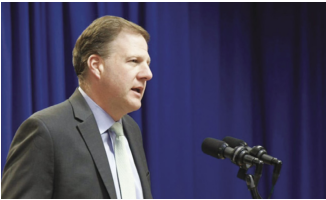More than 5,500 rural
homes, businesses and public buildings will have access to fiber
internet service by the end of the year, thanks to $16 million in
federal funding from the CARES Act. Gov. Chris Sununu announced the
outcome of the application process for Connecting New Hampshire
Emergency Broadband Expansion Program at a press conference on Thursday
afternoon. He only publicly disclosed some of the locations that would
be receiving money, with $6.5 million allocated to projects in the towns
of Bristol, Danbury, Deering, Errol, Hillsborough, Mason, Springfield,
Stoddard and Washington, connecting 3,189 various homes and other
properties.
In the
coming weeks, the governor said he expected he could disclose more
details about the remaining $9.6 million that would build out fiber to
over another 2,400 rural properties. The municipalities and vendors were
still finalizing their own contracts before the state could execute the
grant agreement, he said.
“The
state really doesn’t control that contracting process — it’s between
the vendor and the localities, but we hear they’re pretty close,” the
governor said.
Time is
of the essence as the funds come with stipulations that projects must be
completed by Dec. 15, a mind-boggling quick deadline for telecom
infrastructure.
The
federal funds were distributed to states to provide equitable internet
access during a time of increased demand for high-speed internet as
residents working and attend school remotely, due to the pandemic.
New Hampshire announced the application process in June with an early July application deadline.
Earlier
this week, members of New Hampshire’s congressional delegation sent a
letter to the leaders of the U.S. House and Senate urging them to
address extending that deadline to spend the money.
“We
put an initial $50 million into the fund because it was completely
unknown what the application process would yield,” said Sununu. “To get
the $16 million and to get these projects done in the next few months is
just phenomenal — the fact over 5,500 properties are going to have
access, I think that comes out to an average cost of just under $3,000
per hookup — that’s a great price. We’re able to do it quickly, we’re
able to do it costeffectively and we’re able to have a pretty high
impact to folks across the area.”
Guidelines criticized
In addition to improving internet speeds
and reliability, the fiber buildout “is definitely a property value
enhancer for all of these individuals,” said Sununu.
Reliability
is essential, said Heather Peterson, Peterborough managing broker at
Four Seasons Sotheby’s International Realty, who is seeing homes in the
surrounding towns of Peterborough as well as the Lake Sunapee region
selling within days.
“A lot of them are second homes, and some people are going to telecommute.”
While
the towns of Dublin and Rindge have partnered with Consolidated
Communications to bond for the buildout of fiber, Peterson says
upgrading internet infrastructure is more difficult in larger towns of
6,000 people like Peterborough and Jaffrey, where “the densely populated
areas have cable but half the town does not, so it’s harder to have a
town meeting and get bonding passed because half of the town are happy
and half the town are miserable.”
A
meeting held by the Monadnock Broadband Group, an informal coalition of
municipal officials and other stakeholders in Cheshire County,
criticized the guidelines for the Connecting New Hampshire Emergency
Broadband Expansion Program. Not only did the group cite the extremely
fast turnaround, but also that only 10% of the funding will be
distributed up front, making it risky for companies without existing
infrastructure, and because it excludes preexisting agreements like
those in Dublin and Rindge.
“I think we could have done a lot more
with this money, but we just didn’t have the time, that was one of the
biggest drawbacks is the time constraints the federal government put on
these dollars,” said Sununu. “I think we’re one of the few states doing
it. I think everyone’s trying, but just to be able to get the $16
million out and over 5,000 hooked up, it’s a win and we’ll keep pushing
it.

Sununu announces allocation of federal funds to localities for new infrastructure.